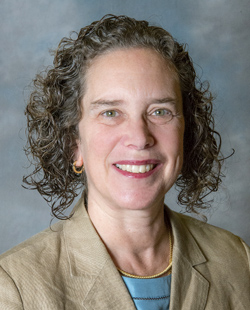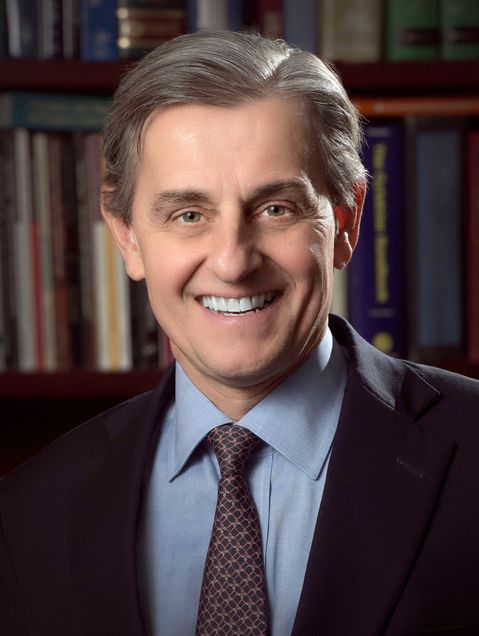Nicole Gibran, Kevin Tracey Receive Distinguished Alumni Awards
Two graduates from the classes of 1983 and 1985 were recognized for their distinguished careers in medicine: neurosurgeon and molecular medicine specialist Kevin Tracey (BUSM ’83) and surgeon and burn specialist Nicole Gibran (BUSM ’85).
Joined by fellow reunioners attending BUSM’s Alumni Weekend luncheon on Friday, May 5, the award recipients were introduced by Alumni Association Associate Dean Jean Ramsey (BUSM ’90, SPH ’08). Gibran and Tracey received the BUSM Alumni Association Distinguished Alumna and Distinguished Alumnus award, respectively, bestowed on graduates who have made outstanding clinical, research and academic contributions to the profession of medicine. They also presented at Grand Rounds, with Gibran speaking on, “Transforming health care: medical homes for the critically injured,” and Tracey on “Treating patients with electrons instead of drugs.”
 Gibran is professor of Surgery and the David & Nancy Auth Washington Research Foundation Chair in Restorative Burn Surgery at the University of Washington (UW) in Seattle as well as director of the UW Medicine Regional Burn Center, Harborview Medical Center. She also serves as adjunct professor of medicine (dermatology) at UW. In addition to her duties as a clinician and teacher, Gibran developed the UW Medicine Regional Burn Center Research Laboratory with emphasis on aberrant healing processes including hypertrophic scar formation and chronic non-healing wounds seen with diabetes mellitus. Her research has been continually funded by NIH since 1997. Currently, she studies genetic and epigenetic pathophysiologic causes of aberrant responses to injury.
Gibran is professor of Surgery and the David & Nancy Auth Washington Research Foundation Chair in Restorative Burn Surgery at the University of Washington (UW) in Seattle as well as director of the UW Medicine Regional Burn Center, Harborview Medical Center. She also serves as adjunct professor of medicine (dermatology) at UW. In addition to her duties as a clinician and teacher, Gibran developed the UW Medicine Regional Burn Center Research Laboratory with emphasis on aberrant healing processes including hypertrophic scar formation and chronic non-healing wounds seen with diabetes mellitus. Her research has been continually funded by NIH since 1997. Currently, she studies genetic and epigenetic pathophysiologic causes of aberrant responses to injury.
 Tracey is professor of Neurosurgery and Molecular Medicine at the Hofstra Northwell School of Medicine, and president and CEO of The Feinstein Institute for Medical Research. He also serves as executive vice president for research at Northwell Health in New York. A leader in the field of inflammation research, his contributions to science include discovery and molecular mapping of neural circuits that control immune responses, and developing this as a method for treating rheumatoid arthritis in a successful clinical trial. He discovered the molecular basis for inflammation occurring in the absence of infection by identifying HMGB1, an abundant component in cell nuclei, as a therapeutic target at the intersection of sterile and infective inflammation. An Inventor with more than 60 United States patents, his biotechnology experience includes co-founding three companies. He is also cofounder and councilor of the Global Sepsis Alliance, a non-profit organization supporting the efforts of more than 1 million caregivers in more than 70 countries to understand and combat sepsis, a leading cause of death worldwide.
Tracey is professor of Neurosurgery and Molecular Medicine at the Hofstra Northwell School of Medicine, and president and CEO of The Feinstein Institute for Medical Research. He also serves as executive vice president for research at Northwell Health in New York. A leader in the field of inflammation research, his contributions to science include discovery and molecular mapping of neural circuits that control immune responses, and developing this as a method for treating rheumatoid arthritis in a successful clinical trial. He discovered the molecular basis for inflammation occurring in the absence of infection by identifying HMGB1, an abundant component in cell nuclei, as a therapeutic target at the intersection of sterile and infective inflammation. An Inventor with more than 60 United States patents, his biotechnology experience includes co-founding three companies. He is also cofounder and councilor of the Global Sepsis Alliance, a non-profit organization supporting the efforts of more than 1 million caregivers in more than 70 countries to understand and combat sepsis, a leading cause of death worldwide.
View all posts